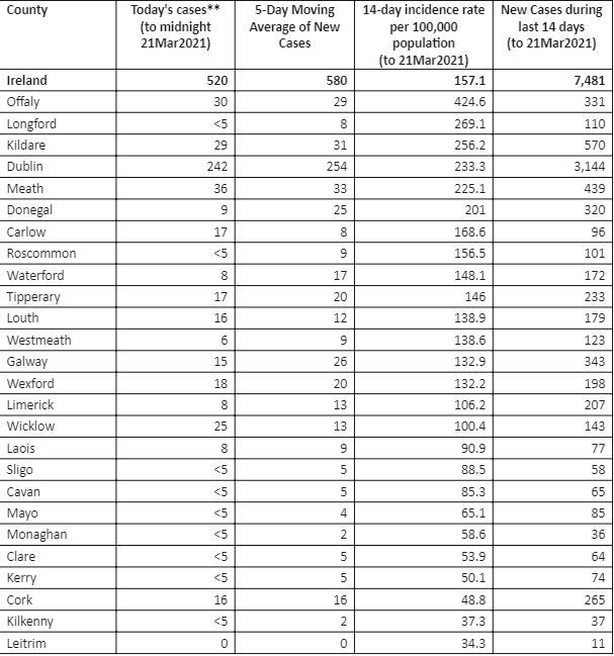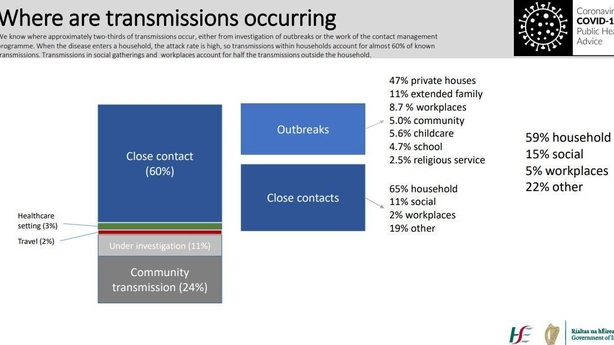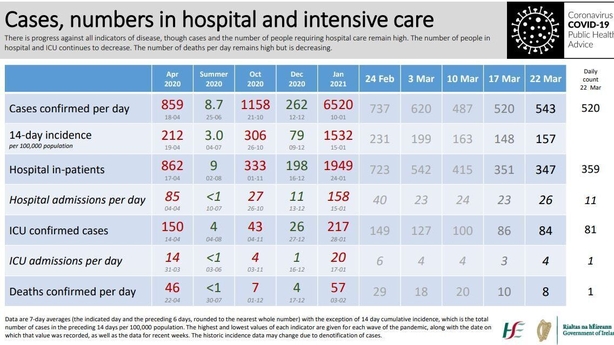The Department of Health has been notified of 520 further cases of Covid-19, while one additional death has also been recorded.
It brings the total number of Covid-19-related deaths in Ireland to 4,588, with the cumulative number of cases since the beginning of the pandemic standing at 231,119.
The number of people hospitalised with the virus stands at 359, while the number in ICU has fallen slightly to 81. There were 14 further hospitalisations in the past 24 hours.
Of today's cases, 79% are under the age of 45, with a median age of 28.
Geographically, 242 cases were confirmed in Dublin, 36 in Meath, 30 in Offaly, 29 in Kildare, and 25 in Wicklow, with the remaining 158 cases spread across 20 other counties.
As of last Friday, a total of 668,529 Covid-19 vaccine doses had been administered, with 181,063 of these being second doses.
The 14-day incidence of the virus nationally now stands at 157.1 per 100,000 people.

Counties with the highest incidence include Offaly, Longford, Kildare and Dublin. Counties with the lowest incidence include Leitrim, Kilkenny, Cork and Kerry.
The HSE's Director of Public Health for the Midlands, Dr Una Fallon, said the high number of cases in Co Offaly is due to an amplification of case numbers in creches, at funerals, factories and other workplaces.
Speaking on RTÉ's Six One News, she said that this happens when people congregate in these settings and it results in a cluster or an outbreak.
Dr Fallon said that although there have been some cases in meat factories, there are now very good controls in these settings and a public health understanding of how to respond.
As a result, the situation in meat factories is under control. Cases have also been uncovered in other types of factories, but they have also been responded to very quickly, she added.
Dr Fallon said there was one substantial outbreak at a creche, but the management and staff have been working very closely with public health and this situation is now under control.
She said that the variant first identified in the UK is responsible for a lot of cases now, but the other variants are not of particular concern in Offaly and the midlands at this time.
We need your consent to load this rte-player contentWe use rte-player to manage extra content that can set cookies on your device and collect data about your activity. Please review their details and accept them to load the content.Manage Preferences
Dr Fallon appealed for people not to congregate and in particular, not to do so in an indoor setting over the Easter period.
She said that people should risk assess their own situation by considering if they were a case, how many close contacts they might have had.
Dr Fallon also said young people in particular, who have minor symptoms should contact their GP and arrange a Covid test. Until they receive a result and know that they do not have Covid, they should remain at home with their families, she commented.
it comes as Northern Ireland recorded its lowest number of new Covid-19 cases for six months.
There were 87 new cases recorded from tests on 1,010 individuals.
One further death has been recorded in the region during the past 24 hours, taking the official toll to 2,105.
Read more:
EU blames AstraZeneca as vaccine row with UK deepens
Changes to Covid restrictions 'gradual and cautious' - Donohoe
Russia open to 'no strings attached' vaccine discussion
Deputy Chief Medical Officer Dr Ronan Glynn has said that no one outbreak is dominating in relation to current case numbers in the Republic.
Speaking during this evening's briefing, he said public health teams had seen outbreaks recently in students, among the Irish Traveller community, a small number in schools, and some in the meat-processing sector.

He also said that given the current case numbers, a "seek and destroy" approach is not realistic for public health tracking and tracing.
"While we have cases as high as we have, this concept of 'seek and destroy', which we would all aspire to, is not realistic at levels of 500, 600, 700 cases a day.
"You won't find a country in Europe that is seeking and destroying cases and clusters of Covid-19 with incidence rates of 150 or 160 per 100,000."
Dr Ronan Glynn says high case numbers in parts of the country are because of outbreaks. There are outbreaks linked to students in Limerick, the Travelling community in a number of locations around the country, schools and meat plants. | Read more: https://t.co/uvtDr7bLax pic.twitter.com/Nip2WImVZz
— RTÉ News (@rtenews) March 22, 2021
Dr Glynn told the briefing that as things are planned, 80% of people will have their first vaccine dose by June.
All of the over-70s and those with underlying conditions will be fully protected by then, he said, adding that the country will then hopefully have much lower disease levels.
He said from that perspective, people can look forward to a "good summer" based on outdoor activities.
"I don't think it's unreasonable to give people that level of hope and reassurance, albeit there are uncertainties," he said.
Dr Ronan Glynn says the vast majority of the population will have a second dose by September, as things are planned. 8 out of 10 people should have a first dose by June, he says. | Read more: https://t.co/uvtDr7bLax pic.twitter.com/4tOkzVrgGJ
— RTÉ News (@rtenews) March 22, 2021
Prof Philip Nolan says they do know where the transmission is happening - 60% of cases are happening through close contact with a confirmed case. One-third of those are linked to wider outbreaks while two-thirds are through simple contact. | Read more: https://t.co/uvtDr7bLax pic.twitter.com/KuJt7dtsLS
— RTÉ News (@rtenews) March 22, 2021
Chair of NPHET's Epidemiological Modelling Group Professor Philip Nolan said that they do know where the majority of transmissions are occurring.
Through the week of 7-13 March, 60% of cases arose through close contact transmission, with 24% occurring in the community, he said.
He added: "59% of transmissions are occurring in households. Outside of the household, almost half of transmissions are occurring in social gatherings and the workplace."
Just under half of all outbreaks are in private households. 5% of outbreak cases are in childcare, 5% in schools, and about 2.5% are associated with religious services, says Prof Philip Nolan. | Read more: https://t.co/uvtDr7bLax pic.twitter.com/Ckwtitnzhj
— RTÉ News (@rtenews) March 22, 2021
Prof Nolan said NPHET is seeing a stabilisation, or possibly the beginning of an increase in case counts, adding that while the pattern was not entirely clear, they will be monitoring it closely.
He said they are concerned that the number of people being admitted to hospital per day has been static at 20-25 for three-and-a-half weeks now.
Prof Nolan said when the infection gets into a household, the "attack rates are very high", adding that up to 33-35% of the contacts within a household will subsequently become infected.

He said the current picture is dominated by a large number of cases within households, and as soon as it gets in, it is amplified one or two-fold by its entry into that household.
Prof Nolan said just under half of outbreaks are in private houses, about 10% are in an extended family, just under 10% are in workplaces, 5% are in complex settings in the community, 5% in childcare, 5% in schools and about 2.5% of the cases associated with outbreaks in Week 10 were associated with religious services.
The situation is 'static' with a concern over the case count in the last week, says Prof Philip Nolan. The overall picture is volatile, he says, and there has been a drift upwards in the five-day moving average in the last few days. | Read more: https://t.co/uvtDr7bLax pic.twitter.com/ADHivJLIlG
— RTÉ News (@rtenews) March 22, 2021
Prof Nolan said it was "quite clear" that there is some concern about a "possible increase" in incidence in children between 0 and 12 years of age, adding that they need to see how that pans out over the coming 10 to 14 days.
He said he is confident in the level of investigation that colleagues in public health are doing, adding that when they say there is very low detection and very low probability of transmission within schools, he is not concerned about this.
He said people also need to be conscious of all of the exposure around schools, such as social interaction around and getting to and from school.
Dr Glynn said there are reports from colleagues in public health that some of the issues they are seeing are to do with activities outside of school, such as play dates and households meeting up.
There is some concern about a possible increase in incidence among children between 0 and 12 years of age, says Prof Philip Nolan. There is very strong investigation going on around schools, he says. | Read more: https://t.co/uvtDr7bLax pic.twitter.com/4EHAVpynVJ
— RTÉ News (@rtenews) March 22, 2021
He said this is in a limited number of circumstances and the vast majority of parents and households are doing the right thing.
Dr Glynn said meat processing plants remain a very high risk for transmission and there is very high levels of community disease, adding that unfortunately, it is inevitable that we will continue to see outbreaks in those settings until the majority of the workforce are vaccinated.
However, he said the serial testing regime was not reduced in frequency at the meat processing plants and they are in the process of rolling out antigen tests there too.
In relation to different variants of the virus in Ireland, Director of the National Virus Reference Laboratory Dr Cillian de Gascun told the briefing there were 26 cases of the strain first identified in South Africa recorded here, as well as nine cases of the variant from Brazil.
